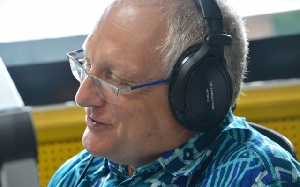Israeli Ambassador to Ghana Ami Mehl has described Ghana’s Afadjato as a hill by his standard and experience.
Mr Mehl, who worked as a tour guide in Israel before becoming a diplomat, said: “I climbed Afadjato, on the other side… It is not [a] mountain, it is a hill, it is 885 metres above sea level and that’s not a mountain… It is very easy to climb. For me, it was very easy, I’m young, only 60 years old.”
Mr Mehl, who has spent two years in Ghana, has visited almost every tourist site in Ghana and praised the country for its “rich culture and tourism beyond ‘banku’ and ‘fufu’”.
He recounted his tourist adventures in Ghana during an interview on Class FM’s World Affairs with Dr Etse Sikanku.
He described the Mole National Park as a “beautiful place, a safari that I enjoyed very much”.
He said he had a good trip to Axim and experienced “the beautiful beaches, clean ones” and visited Nzulezu “which is a very unique place”.
He was, however, not enthused about the destruction of the environment due to illegal mining popularly known as galamsey.

Mr Mehl lauded government’s resolve to fight galamsey and explained that Israel was willing to assist the Akufo-Addo led-government in the area of intelligence and rehabilitation of river bodies.
He was of the view that illegal small-scale mining, known as galamsey, is not just a local menace but affects the rest of the world.
He noted that the business of galamsey has thrived due to corruption, and Ghana can progress if it is able to fight against this canker.
“The galamsey fight is not a local issue… the environment is not local. The poison that is going into the rivers also goes into the sea, and the ocean also goes to other countries, so it is not a local issue.

“There is galamsey of gold but there is also the galamsey of the sea. All those huge ships that are robbing the fishery [industry] and destroying the ocean [are] also a kind of galamsey which is destroying the economy of Ghana and destroys the possibilities of many people [working] as fishermen, and part of the problem is corruption because I’m sure that those people who are doing that kind of galamsey work of gold or fish get some support from people who have to fight against them. It’s not something I can prove, but you cannot work without that kind of support.”
Touching on what Israel can do to assist Ghana’s fight against galamsey, Mr Mehl said: “You know that you have international backing to what you are doing. We have the technology and experience in many things. So if we are talking about fighting galamsey, if you need intelligence, we have the technology that will give you the intelligence that you need.
“We are talking about the damage to the environment and it’s a serious damage… We’re talking about water being poisoned by mercury and these are things that are difficult to fight. But Israeli companies, including companies that are already here in the market, have the technology to fight it. Here you cannot do a half-job, it’s either you clean the water or you have dirty water. You cannot have half clean water, 50-50; it’s 100 per cent clean or dirty… So if we are talking about fighting galamsey and rehabilitation of the rivers and the waters in Ghana, we can do it and we can guarantee that Ghana will have clean rivers in quite a short time, but it costs money. It is not a present from God. God makes miracles but people have to pay for the miracles.”
General News of Friday, 26 May 2017
Source: classfmonline.com

















